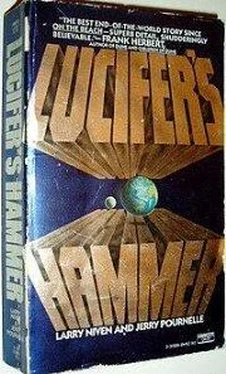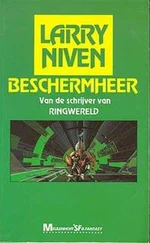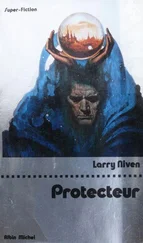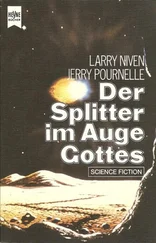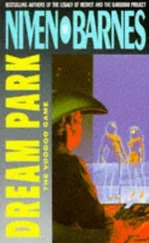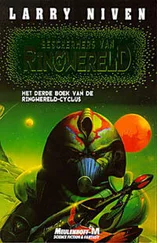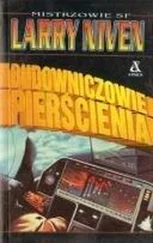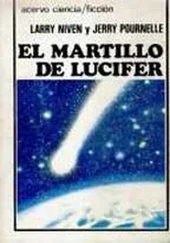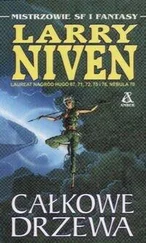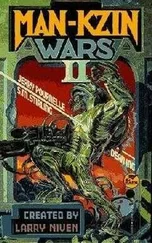The studio audience applauded. They hadn’t been cued by the production assistants, but they applauded. Johnny gave Sharps an approving smile and decided how the program would go for the rest of the night. But first there was a frantic signal: time for a Kalva Soap commercial.
There was more after the commercial. When Sharps got going he was really dynamic. His thin, bony hands waved around like windmills. He talked about windmills, too, and about how much power the Sun put out every day. About the solar flare Skylab’s crew had observed. “Johnny, there was enough power in that one little flare to run our whole civilization for hundreds of years! And those idiots talk about doom!”
But they were neglecting Tim Hamner, and Johnny had to bring him into the conversation. Hamner was sitting there nodding, obviously enjoying Sharps. Johnny carefully maneuvered the scientist back onto the comet, then saw his chance. “Charlie, you said the Russians would get a close look at Hamner-Brown. How close?”
“Pretty close. We’ll definitely pass through the tail of the comet. I showed you why we can’t tell how close the head will come — but it’s going to be very close. If we’re lucky, maybe as close as the Moon.”
“I wouldn’t call that luck,” Mary Jane said.
“Tim, it’s your comet,” Johnny said. “Could Hammer-Brown actually hit us?”
“That’s Hamner-Brown,” Tim said.
“Oh.” Johnny laughed. “What did I say? Hammer? It would be a hammer if it hit, wouldn’t it?”
“You know it,” Charlie Sharps said.
“Just what would it do?” Johnny asked.
“Well, we’ve got some pretty big holes left from meteor strikes,” Tim said. “Meteor Crater in Arizona is nearly a mile wide. Vreedevort in South Africa is so big you can’t see it except from the air.”
“And those were the little ones,” Sharps said. They all turned to look at him. Sharps grinned. “Ever notice how circular Hudson’s Bay looks? Or the Sea of Japan?”
“Were those meteors?” Johnny asked. The thought was horrifying.
“A lot of us think so. And something pretty big cracked the Moon wide open — a quarter of its surface is covered by that so-called ocean, which was once a sea of lava welling up from where a big asteroid hit.”
“Of course, we don’t know what Hamner-Brown is made of,” Tim said.
“Maybe it’s time we found these things out,” Mary Jane said. “Before one of them does hit us. Like this one.”
“It’s only a matter of time,” Sharps said. “Give it long enough and the probability of a comet hitting us approaches certainty. But I don’t think we have to worry about HamnerBrown.”
Henry Armitage was a TV preacher. He’d been a radio preacher until one of his converts left him ten million dollars; now he had his own slick-paper magazine, TV shows in a hundred cities, and an elaborate complex of buildings in Pasadena, complete with editorial staff.
For all that, Henry wrote much of the magazine himself, and he always did the editorials. There were too few hours in the day for Henry. He gloried in the troubles of the world. He knew what they meant. They were the signs of a greater joy to come.
For the disciples had asked the Master, “ ‘Tell us, when shall these things be? And what shall be the sign of thy coming, and of the end of the world?’
“And Jesus answered and said unto them, ‘Take heed that no man shall deceive you. For many shall come in my name saying “I am Christ”; and shall deceive many.’ ” Henry had seen the entry on the Inyo County, California, police blotter: “Charles Manson, also known as Jesus Christ, God.”
“And you shall hear of wars and rumours of wars: see that ye be not troubled: for all these things must come to pass, but the end is not yet. For nation shall rise against nation, and kingdom against kingdom; and there shall be famines, and pestilences, and earthquakes, in divers places.”
Matthew was Henry’s favorite Gospel; and of all the Bible, that was his favorite text. Were these not the times Christ spoke of? The signs were all present in the world.
He sat at his expensive desk. The TV was concealed behind a panel that opened when Henry touched a button. It was a long way from the wood-frame, whitewashed one-room church in Idaho where Henry had started in the Thirties. The ostentatious wealth sometimes disturbed Henry, but his supporters insisted on it, even if Henry and his wife would have been as happy in plainer surroundings.
Henry toyed with his editorial, but he didn’t feel inspired. As a lesson in humility he had the TV turned to an interview show; the lesson was to watch that shallow frivolity without hating those who took part in it; and that was hard, hard…
Something caught his attention. A thin tall man in a herringbone sport jacket, arms waving about. Henry admired his technique. The man would make an impressive preacher. He focused all attention on himself, and his words washed across the listener.
The man was talking about a comet. A comet. A sign in the heavens? Henry knew what comets were, but because comets were natural did not mean that their timing was not miraculous. Henry had seen many healed by prayer and the doctors later “explain” the miracle.
A comet. And it would pass very close to Earth. Could this be the final sign of all? He drew a yellow lined tablet toward him and began writing in sloppy block print, using a dozen pencils. He was through three sheets before he knew his headline, and he turned back to the first page.
In two weeks his magazine would be in half a million homes around the world; and across the cover in blazing red twenty point type would be his headline:
THE HAMMER OF GOD
It would make a good text for his TV shows, too. Henry began writing frantically, feeling the way he had felt nearly forty years before, when he’d really begun to understand Matthew 24 and had carried the message to a world that didn’t care.
The Hammer of God was coming to punish the decadent and the willful. Henry wrote eagerly.
From the fury of the Norsemen,
Spare us, good Lord.
From the great comet,
Good Lord deliver us.
Medieval litany
Tim Hamner arrived in a taxi just as Harvey’s TravelAII reached JPL. As Tim handed the driver a twenty and waved him away, Harvey swore; then he put on his best face as Tim came over to join him.
Hamner looked sheepish. “Look, Harvey, I said I wouldn’t interfere — and I won’t. But I met Sharps on that interview show.”
“Yeah, I saw that,” Harvey said. “Sharps was great.”
“He sure was,” Hamner said. “I want to meet him again. I called JPL and they said you were coming here for an interview. Harvey, I want to come along.”
Inwardly Harvey felt anger, but it was a reasonable request from a sponsor. “Sure.”
Charlene, the PR lady, was waiting, and she didn’t make any fuss about Tim Hamner’s unexpected appearance with the crew. Sharps’s office hadn’t changed. There were different books scattered across the expensive desk, and instead of an IBM print-out there was a large diagram. The cast changes, Harvey thought, but the play’s the same.
“What ho,” Sharps said. He lifted a brow at Hamner. “Sponsor coming along to check on you? Harvey, I hope this won’t take long. I’m due in the labs shortly.”
Harvey waved to the crew. Charlie was already setting up, and Mark moved around with the light meter. Mark had become pretty good at this job, and he’d stayed around longer then Harvey could remember him keeping a job before. If he left, Harvey would miss him.
“We’re interested in the probe,” Harvey said. “Does it look as if it will really go?”
Читать дальше
